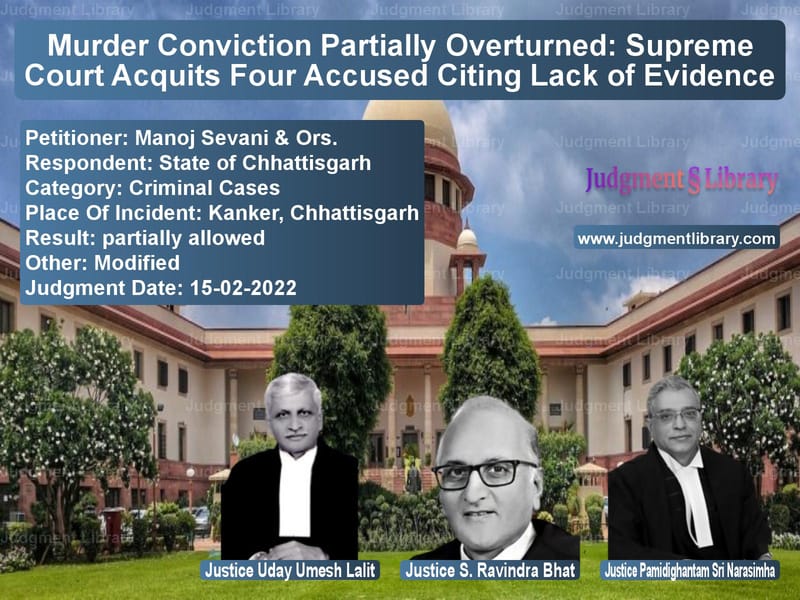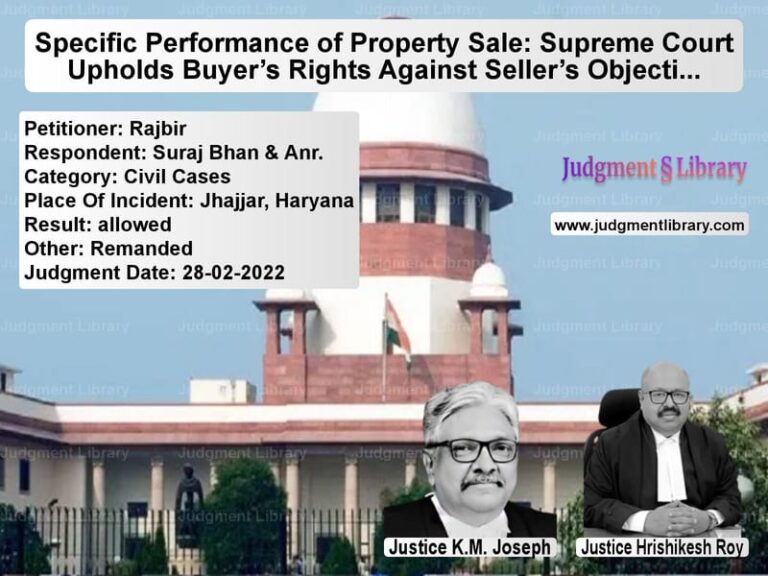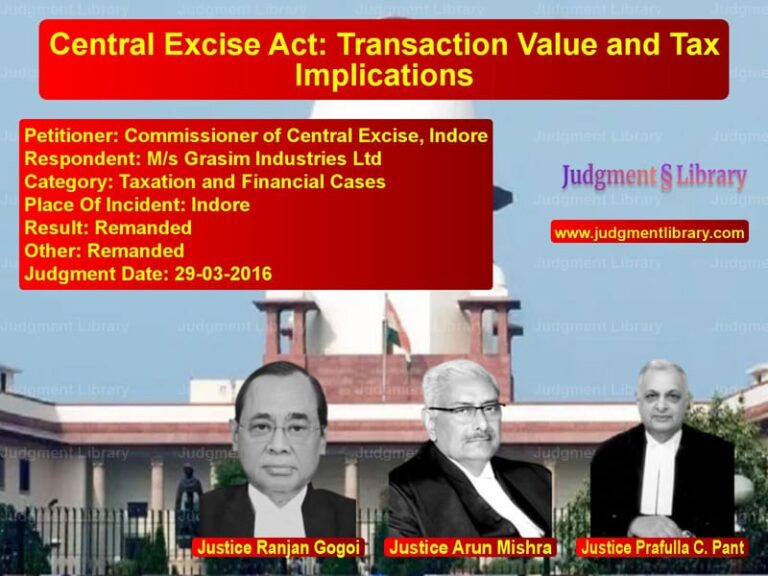Murder Conviction Partially Overturned: Supreme Court Acquits Four Accused Citing Lack of Evidence
The Supreme Court’s ruling in Manoj Sevani vs. State of Chhattisgarh is a significant case that examines the principle of collective criminal liability under Section 149 of the Indian Penal Code (IPC). The case revolved around a group assault leading to the murder of one person and injuries to another. This judgment clarifies the distinction between direct participation in a crime and indirect association with an unlawful assembly.
Background of the Case
The case stems from an incident on 18 August 2009, in Kanker, Chhattisgarh, where a group of men allegedly attacked the deceased, Durgesh Mahant, and the injured victim, Natwar Soni. The police charged twelve individuals under Sections 147, 148, 302/149, 307/149, and 324/149 of the IPC. Additionally, one accused was charged under the Arms Act.
The trial court convicted all twelve accused, sentencing them to life imprisonment for murder, seven years for attempted murder, and one year for causing hurt. The Chhattisgarh High Court upheld the convictions of nine accused while acquitting three. Subsequently, eight of the convicted individuals appealed to the Supreme Court.
Arguments by the Parties
Petitioner’s Arguments (Appellants)
- The FIR initially named only four accused, with the identities of others added later, raising doubts about their involvement.
- The prosecution’s key witness, PW-1, did not attribute any specific role to several accused.
- The medical evidence contradicted the prosecution’s claim that multiple accused inflicted injuries.
- The convictions relied heavily on Section 149 IPC, which requires clear proof of a common unlawful objective.
- The appellants sought acquittal or modification of their sentences based on the lack of direct involvement.
Respondent’s Arguments (State of Chhattisgarh)
- The prosecution presented multiple eyewitnesses, including PW-1 and PW-2, who testified about the attack.
- Medical reports confirmed the fatal injuries on the deceased and serious injuries on the injured victim.
- The presence of all accused at the crime scene established their collective responsibility under Section 149 IPC.
- The trial and High Court correctly applied the legal principles of unlawful assembly and common intention.
Supreme Court’s Key Observations
1. Differentiating Between Direct and Indirect Participation
The Supreme Court carefully examined the roles of each accused, stating:
“Accused No.1 Dinesh Rawani, who was armed with a gupti, gave a fatal blow on the chest of the deceased, as well as inflicted injuries on the injured witnesses.”
The Court found that three other accused—Brijesh Sonkar, Mani Yadav, and Parmesh Thakur—also inflicted significant injuries. However, for the remaining accused, there was no clear evidence of direct participation in the assault.
2. Lack of Evidence Against Some Accused
The Supreme Court noted:
- Only four accused were named in the FIR, and others were added later.
- Witnesses gave inconsistent statements about the role of the additional accused.
- Some accused were merely present but did not actively participate in the crime.
“Except accused No.1 to 4, none of the other accused was stated to have given any blow to the deceased.”
3. Acquittal of Four Accused
The Court found that the prosecution failed to establish collective criminal liability for accused Sayyed Javed, Manoj Sevani, Manoj Yadav, and Manohar Balmiki. Their conviction under Section 149 IPC was overturned, and they were acquitted.
4. Modification of Charges for Remaining Convicts
For the four accused who actively participated, the Court modified their convictions:
- Instead of Section 302/149 IPC, they were convicted under Section 302/34 IPC, recognizing shared intent but not unlawful assembly.
- Similarly, their conviction under Section 307/149 IPC was modified to Section 307/34 IPC.
Final Judgment
The Supreme Court ruled:
- The conviction of accused Dinesh Rawani, Brijesh Sonkar, Mani Yadav, and Parmesh Thakur under Sections 302/34 IPC and 307/34 IPC was upheld.
- The conviction of accused Sayyed Javed, Manoj Sevani, Manoj Yadav, and Manohar Balmiki was overturned.
- The acquitted accused were ordered to be released immediately unless detained in other cases.
Impact of the Judgment
This ruling reinforces important legal principles:
- Collective liability under Section 149 IPC requires clear evidence of a common unlawful objective.
- Merely being present at a crime scene does not make someone guilty.
- Medical evidence must align with prosecution claims to sustain charges.
- Acquittals based on reasonable doubt are necessary when prosecution evidence is weak or inconsistent.
The Supreme Court’s decision serves as a crucial precedent for interpreting group liability in criminal cases and ensures that justice is administered based on individual roles rather than generalized accusations.
Petitioner Name: Manoj Sevani & Ors..Respondent Name: State of Chhattisgarh.Judgment By: Justice Uday Umesh Lalit, Justice S. Ravindra Bhat, Justice Pamidighantam Sri Narasimha.Place Of Incident: Kanker, Chhattisgarh.Judgment Date: 15-02-2022.
Don’t miss out on the full details! Download the complete judgment in PDF format below and gain valuable insights instantly!
Download Judgment: manoj-sevani-&-ors.-vs-state-of-chhattisgar-supreme-court-of-india-judgment-dated-15-02-2022.pdf
Directly Download Judgment: Directly download this Judgment
See all petitions in Murder Cases
See all petitions in Attempt to Murder Cases
See all petitions in Judgment by Uday Umesh Lalit
See all petitions in Judgment by S Ravindra Bhat
See all petitions in Judgment by P.S. Narasimha
See all petitions in partially allowed
See all petitions in Modified
See all petitions in supreme court of India judgments February 2022
See all petitions in 2022 judgments
See all posts in Criminal Cases Category
See all allowed petitions in Criminal Cases Category
See all Dismissed petitions in Criminal Cases Category
See all partially allowed petitions in Criminal Cases Category







